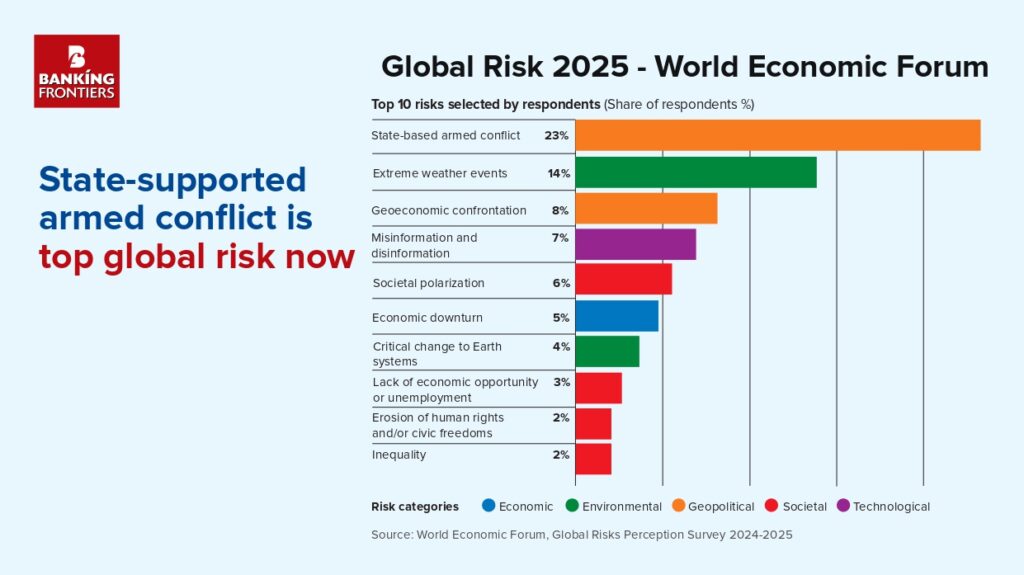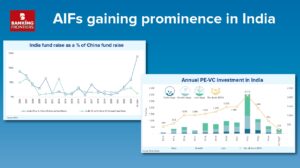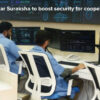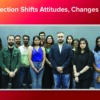The 20th edition of the World Economic Forum’s Global Risk Report traces the changing global risk scenario:

State-based armed conflict is the most pressing immediate global risk for 2025, according to the 20th edition of the World Economic Forum’s Global Risks Report, which was released recently. Economic risks have been assigned less immediate prominence in the report.
The report says nearly one-quarter of respondents said state-based armed conflict is the most severe concern for the year ahead.
The report, prepared by the Global Risks Initiative at the World Economic Forum’s Centre for the New Economy and Society, leverages insights from the Global Risks Perception Survey, which draws on the views of over 900 global leaders across business, government, academia and civil society. It identifies and analyzes the most pressing risks across immediate, short- and long-term horizons, aiming to equip leaders with foresight to address emerging challenges. It serves as a key resource for understanding the evolving global risk landscape and fostering collective action to build a more resilient future.
LESS OPTMISTIC OUTLOOK
Prepared during September – October 2024, it gives a stark picture of the decade ahead as most of the respondents are far less optimistic about the outlook for the world over the longer term than the short term. Nearly two-thirds of respondents expect a turbulent or stormy global landscape by 2035, driven in particular by intensifying environmental, technological and societal challenges.
Over half of respondents say some instability is expected within 2 years, as seen by the widespread fracturing of international cooperation. There will be greater challenges in the long-term, they believe, as mechanisms for collaboration are expected to face mounting pressure.
The respondents are also concerned about illicit economic activity, mounting debt burdens and the concentration of strategic resources and they feel these vulnerabilities could destabilize the global economy in the coming years.
MISINFORMATION, DISINFORMATION
The report lists misinformation and disinformation as the top short-term risks for the second consecutive year. These amount to persistent threat to societal cohesion and governance by eroding trust and exacerbating divisions within and between nations, says the report.
Other short-term risks include extreme weather events, societal polarization, cyber-espionage and warfare. The other prominent environmental risk in the top 10 is pollution, which is also perceived as a leading risk in the short term. Its sixth-place is the serious health and ecosystem impacts as a result of pollutants across air, water and land.
The report also mentions technological risks related to misinformation, disinformation and adverse outcomes of AI technologies.
ECONOMIC RISKS SUBSIDE
The report says concern over 2 economic risks – inflation and economic downturn (recession and stagnation), which were in the top 10 ranking last year, have since subsided. There are no economic risks in the top 10. Inflation, which was No 7 last year, has fallen to No 29, with a similar decline for economic downturn, which was No 9 last year and is now No 19. However, there is an ongoing concern about debt among government stakeholders (at No 7), and crime and illicit economic activity among international organizations, private-sector and government respondents (No 6, No 7 and No 8, respectively).
The report mentions about adverse outcomes of frontier technologies, including biotech, and says this is one of the risks with the sharpest rise between the 2-year and 10-year time horizons. It says while global risks stemming from the field of biotech are not top of mind today, they will become more so within a decade. “There are 3 sets of risks in biotech that need to be watched closely over the coming years: rising accessibility of bioweapons; negative health impacts as the flipside of efforts to cure or prevent health issues, and the potential for those with access to leading-edge biotech to cross ethical boundaries,” says the report.
SUPER-AGING RISK
The report discusses the risk of super-aging societies and predicts that:
- pension crises will start to bite over the next decade in super-ageing societies as dependency ratios rise further and government finances are stretched;
- labour shortages in several sectors, in particular long-term care, are likely to become a characteristic of super-ageing societies unless policies shift; and
- super-ageing societies will pose global economic and labour-market challenges, even for countries still benefiting from their demographic dividend.
The report says as divisions deepen and fragmentation reshapes geopolitical and economic landscapes, the need for effective global cooperation has never been more urgent. However, with 64% of experts anticipating a fragmented global order marked by competition among middle and great powers, feel multilateralism could face significant strain.
The report advocates that in order to prevent a downward spiral of instability – and instead rebuild trust, enhance resilience, and secure a sustainable and inclusive future for all – nations should prioritize dialogue, strengthen international ties and foster conditions for renewed collaboration.
Recent Articles:
AIFs gaining prominence in India









